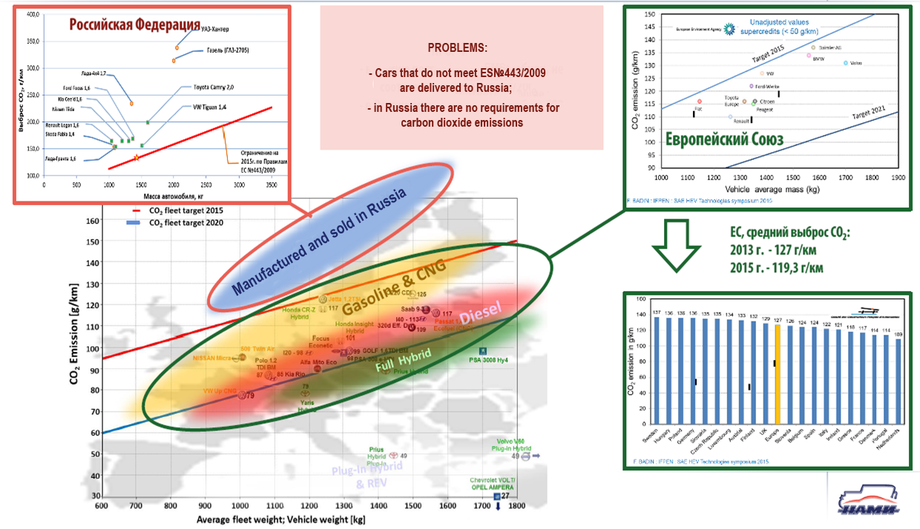Environmental studies

Transport Integration Ltd. has solid experience in developing documents on assessment of the environmental impact of the transport sector of the Russian Federation:
- strategies, concepts and programs for the transition of the transport sector of the Russian Federation to sustainable low-carbon development and higher energy efficiency of vehicles;
- strategies, concepts and programs for adapting operations of the transport sector of the Russian Federation to climate change;
- measuring emissions of greenhouse gas and pollutants from various transport systems;
- transport environmental monitoring systems for regions, cities, transport hubs and linear transport facilities (roads, railways, inland waterways);
- comprehensive environmental safety systems for transport facilities;
- EIA and environmental protection measures;
- development and introduction of environmental standards and environmental monitoring systems for transport companies, cities and regions of the Russian Federation.
- strategies, concepts and programs for the transition of the transport sector of the Russian Federation to sustainable low-carbon development and higher energy efficiency of vehicles;
- strategies, concepts and programs for adapting operations of the transport sector of the Russian Federation to climate change;
- measuring emissions of greenhouse gas and pollutants from various transport systems;
- transport environmental monitoring systems for regions, cities, transport hubs and linear transport facilities (roads, railways, inland waterways);
- comprehensive environmental safety systems for transport facilities;
- EIA and environmental protection measures;
- development and introduction of environmental standards and environmental monitoring systems for transport companies, cities and regions of the Russian Federation.

Assignments completed by Transport Integration Ltd. for federal executive authorities:
- Comprehensive assessment of the impact of ratification of the Paris Climate Agreement on the transport industry of the Russian Federation;
- Sectoral national methodologies for measuring greenhouse gas emissions from all transport systems in the Russian Federation;
- Methodologies to identify transport infrastructure in the Russian Federation that is at risk of complete or partial functionality loss due to expected climate change including the thawing of permafrost;
- Sectoral national methodologies for calculating risks and assessing possible impact of expected climate change including the thawing of permafrost on transport infrastructure;
- Methods for adapting transport infrastructure of the Russian Federation to expected climate change, etc.
- Comprehensive assessment of the impact of ratification of the Paris Climate Agreement on the transport industry of the Russian Federation;
- Sectoral national methodologies for measuring greenhouse gas emissions from all transport systems in the Russian Federation;
- Methodologies to identify transport infrastructure in the Russian Federation that is at risk of complete or partial functionality loss due to expected climate change including the thawing of permafrost;
- Sectoral national methodologies for calculating risks and assessing possible impact of expected climate change including the thawing of permafrost on transport infrastructure;
- Methods for adapting transport infrastructure of the Russian Federation to expected climate change, etc.
The advantages of Transport Integration Ltd. are as follows:
- solid experience in forecasting environmental impact of the transport sector, and developing comprehensive environmental safety systems for transport facilities, environmental impact assessments and environmental protection measures;
- extensive expertise in the development of transport environmental monitoring systems for regions, cities, transport hubs and linear transport facilities;
- databases that provide understanding of energy efficiency of various transport modes;
- methodologies for evaluation of the effectiveness of the introduction of environment protection measures;
- specialists with broad expertise to produce comprehensive documents covering technical, economic, environmental and legal aspects.
- extensive expertise in the development of transport environmental monitoring systems for regions, cities, transport hubs and linear transport facilities;
- databases that provide understanding of energy efficiency of various transport modes;
- methodologies for evaluation of the effectiveness of the introduction of environment protection measures;
- specialists with broad expertise to produce comprehensive documents covering technical, economic, environmental and legal aspects.
List of services +
assessment of the ecological condition of the natural environment in locations of existing and planned transport infrastructure;
preparation of strategies, concepts and programs for the transition of the transport sector of the Russian Federation to sustainable low-carbon development and higher energy efficiency of vehicles;
preparation of strategies, concepts and programs for adapting operations of the transport sector of the Russian Federation to climate change;
forecasting environmental development of territories and transport facilities;
measuring emissions of greenhouse gas and pollutants from various transport systems;
development of transport environmental monitoring systems for regions, cities, transport hubs and linear transport facilities (roads, railways, inland waterways);
development of comprehensive environmental safety systems for transport facilities;
environmental impact assessment and development of environmental protection measures;
development of environmental policies for transport companies;
development of methodologies for calculation of environmental and economic effectiveness and measuring the environmental damage prevented;
development and introduction of environmental standards, environmental monitoring and environmental audit systems for transport companies, cities and regions of the Russian Federation;
development of environmental requirements for transport infrastructure construction projects;
identifying transport infrastructure located in the Arctic zone of the Russian Federation and in permafrost areas, which is at risk of complete or partial loss of functionality due to expected climate change;
risk assessment for transport infrastructure in relation to hazardous climate change in the Arctic zone and permafrost areas;
preparation of proposals on possible scenarios for adaptation of transport infrastructure to ongoing and expected climate change.
© 2020 Transport Integration Ltd.
created by Soleprop.ru



